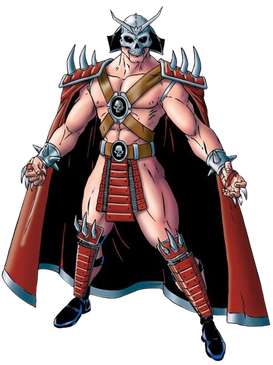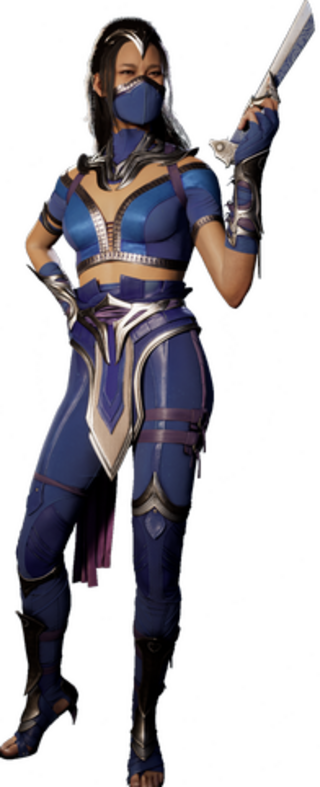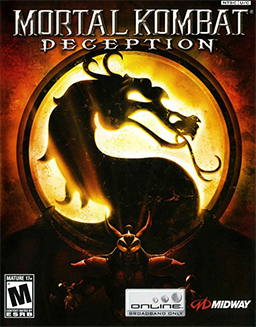
Mortal Kombat: Annihilation is a 1997 American martial arts fantasy film directed by John R. Leonetti in his directorial debut. Based on the Mortal Kombat video game franchise, it is the second installment in the Mortal Kombat film series and a sequel to the original 1995 film, of which Leonetti served as cinematographer. Largely an adaptation of the video game Mortal Kombat 3 (1995), Annihilation follows Liu Kang and his allies as they attempt to stop the malevolent Shao Kahn from conquering Earthrealm. It stars Robin Shou as Liu, Talisa Soto as Kitana, James Remar as Rayden, Sandra Hess as Sonya Blade, Lynn Red Williams as Jax, and Brian Thompson as Kahn. Only Shou and Soto reprise their roles, with the rest of the characters recast from the previous film.

Shao Kahn is a fictional character in the Mortal Kombat fighting game franchise by Midway Games and NetherRealm Studios. Depicted as emperor of the fictional realm Outworld, he is one of the franchise's primary villains. Feared for his immense strength, which he complements with a large hammer, and knowledge of black magic, Shao Kahn seeks conquest of all the realms, including Earth. He serves as the final boss of Mortal Kombat II (1993), Mortal Kombat 3 (1995) and its updates, and the 2011 reboot, as well as the action-adventure spin-off Mortal Kombat: Shaolin Monks (2005). An amalgam of Shao Kahn and DC Comics villain Darkseid also appears as the final boss of Mortal Kombat vs. DC Universe (2009) under the name Dark Kahn.

Mileena is a fictional character in the Mortal Kombat fighting game franchise by Midway Games and NetherRealm Studios. Introduced in Mortal Kombat II (1993), she is a clone of the Edenian princess Kitana, created with the blood of the fictional Tarkatan species. Her creation results in her developing the deformed facial features of the Tarkatan, which she conceals with a veil. A power-hungry, unstable villain throughout most of the series, Mileena uses a pair of sai as her primary weapons. She is also the love interest of the Tarkatan warrior Baraka or Edenian traitor Tanya.

Kitana is a fictional character in the Mortal Kombat fighting game franchise by Midway Games and NetherRealm Studios. Debuting in Mortal Kombat II (1993), she is a royal from the fictional realm of Edenia. Her primary weapon is a pair of steel fans, which she uses for most of her special attacks.

Mortal Kombat 3 is a 1995 arcade fighting game developed by Midway Games and first released into arcades in 1995. It is the third main installment in the Mortal Kombat franchise and a sequel to 1993's Mortal Kombat II. As in the previous games, it has a cast of characters that players choose from and guide through a series of battles against other opponents. The game avoids the tournament storyline of its predecessors, as various warriors instead fight against the returning Shao Kahn, who has resurrected his bride Sindel and started an invasion of Earthrealm.

Scorpion is a fictional character in the Mortal Kombat fighting game franchise by Midway Games and NetherRealm Studios. An undead ninja, Scorpion made his debut in the original 1992 game and subsequently appeared in every main installment of the series alongside Raiden. He is principally defined by his quest to avenge the deaths of himself, his family, and his clan. His primary weapon is a kunai-rope dart, which he uses to harpoon opponents, while his trademark fatality is the "Fire Breath" in which he removes his mask to reveal a skull right before immolating his opponent.

Mortal Kombat Trilogy is a fighting game released by Midway in 1996 as the second and final update to Mortal Kombat 3 for the PlayStation, Nintendo 64, Sega Saturn and PCs. Further versions were also released for the Game.com and R-Zone. It features a similar basic gameplay system and the same story as Ultimate Mortal Kombat 3, but adds characters and stages restored from Mortal Kombat and Mortal Kombat II. New additions to the game included the "Aggressor" bar. The Brutality mechanic from the Super NES and Genesis versions of Ultimate Mortal Kombat 3 was incorporated. The game was met with positive to mixed reviews upon release.

Mortal Kombat II is a 1993 arcade fighting game originally produced by Midway for the arcades in 1993. It was ported to multiple home systems, including MS-DOS, Amiga, Game Boy, Game Gear, Sega Genesis, 32X, Sega Saturn, Super Nintendo Entertainment System, and PlayStation only in Japan, mostly in licensed versions developed by Probe Entertainment and Sculptured Software and published by Acclaim Entertainment.

Fatality is the name given to a gameplay feature in the Mortal Kombat series of fighting video games, in which the victor of the final round in a match inflicts a brutal and gruesome finishing move onto their defeated opponent. Prompted by the announcer saying "Finish Him/Her", players have a short time window to execute a Fatality by entering a specific button and joystick combination, while positioned at a specific distance from the opponent. The Fatality and its derivations are notable features of the Mortal Kombat series and have caused a large cultural impact and controversies.

Reptile is a fictional character in the Mortal Kombat fighting game franchise by Midway Games and NetherRealm Studios. He debuted in the original 1992 game as a hidden opponent, establishing him as the first secret character in fighting game history. He became playable in the follow-up Mortal Kombat II (1993), and has remained a mainstay of the franchise. As implied by his name, he is a Saurian, a fictional species of reptilian humanoids, and is depicted throughout the series as the last surviving member of his race; he aligns himself with the series' primary villains in the hope that his service will lead to the Saurians' revival.

Mortal Kombat: Deception is a 2004 fighting video game developed and published by Midway and it is the sixth main installment in the Mortal Kombat franchise and a sequel to 2002's Mortal Kombat: Deadly Alliance. It was released for the PlayStation 2 and Xbox in October 2004, for the GameCube in March 2005 and later ported for the PlayStation Portable under the title Mortal Kombat: Unchained in November 2006. Mortal Kombat: Deception follows the storyline from the fifth installment, Deadly Alliance. Its story centers on the revival of the Dragon King Onaga, who attempts to conquer the realms featured in the series after defeating the sorcerers Quan Chi and Shang Tsung, the main antagonists in the previous game, and the Thunder God Raiden, defender of Earthrealm. The surviving warriors from the previous titles join forces to confront Onaga.

Sonya Blade is a fictional character in the Mortal Kombat fighting game franchise by Midway Games and NetherRealm Studios. She debuted in the original 1992 game as the roster's sole female fighter. Inspired by martial artist Cynthia Rothrock, she is a military officer with the Special Forces.

Ultimate Mortal Kombat 3 is a fighting game in the Mortal Kombat series, developed and released by Midway to arcades in 1995. It is a standalone update of 1995's earlier Mortal Kombat 3 with an altered gameplay system, additional characters like the returning favorites Kitana and Scorpion who were missing from Mortal Kombat 3, and some new features.

Mortal Kombat: Defenders of the Realm is a 1996 American animated series based on the popular Mortal Kombat video game series. Produced by Threshold Entertainment and Film Roman, it aired on the USA Network's Action Extreme Team animation block for one season of thirteen episodes from September to December 1996, back-to-back with the Street Fighter animated series. The show serves as a combination of an alternative sequel to the first Mortal Kombat film and the events of Ultimate Mortal Kombat 3.

Daniel Pesina is an American martial arts expert and a former freelance employee of Midway.
Ho-Sung Pak is a Korean-American film actor, stunt performer, martial artist, action choreographer, game character, writer, and producer.

Thea Realm Fighters (TRF) is an unreleased fighting game that was in development by High Voltage Software and planned to be published by Atari Corporation on a scheduled October 1995 release date exclusively for both the Atari Jaguar and the Atari Jaguar CD add-on.

Liu Kang is a fictional character in the Mortal Kombat fighting game series by Midway Games and NetherRealm Studios. Depicted as Earthrealm's greatest warrior and champion, he is generally the main hero of the series. He debuted in the original 1992 game as a Shaolin monk, and has since appeared in nearly every main installment of the series except Mortal Kombat: Deadly Alliance and its second version. He is also a protagonist of the action-adventure beat 'em up spinoff game Mortal Kombat: Shaolin Monks (2005).

Mortal Kombat is the series of comic books published by Malibu Comics based on the Mortal Kombat video games series license between 1994 and 1995. While the comic books by Midway Games depict the games' official storyline, Malibu's story arcs are official publishings of the game providing alternative scenarios for the early Mortal Kombat series, thus favouring the "what if" theories. The series also features several original characters, mostly exclusive to it. It was published by Trielle Komix in Australia.
















